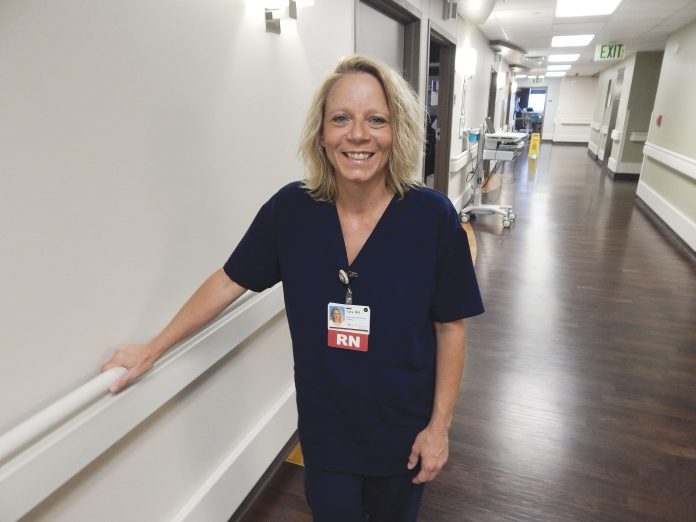
by James Coburn
Staff Writer
Being a nurse at OU Medical Center Edmond is being part of a family environment, said Tara Smith, RN, supervisor, fourth floor medical surgical unit. That is why she came back to the hospital.
Smith attended Francis Tuttle and finished her degree to become a registered nurse at Rose State College. She worked from 2000-05 as part of the flex pool staff before doing travel nursing. When she returned home she rejoined the hospital staff in 2008
“Nurses spend a lot of time at work, sometimes more than they do with their own families,” Smith said. “So this is my second family. We treat each other as family here. If one is down, one’s had a death, we take care of each other.”
The environment of the 28-bed unit is highly supportive, she said. There is also an overflow unit with eight more beds.
Since she came back to the hospital she has found the leadership team to be impeccable, she said.
“I’ve never found so much support from the leadership team here as I have any other place I have worked,” Smith continued.
She said she would not love her job as much if she did not have the team of nurses and supportive staff at the hospital working above their line of duty. They are the best team of nurses she has ever known, she said. They are very supportive of one another.
“There is no ‘I’ in the team,” Smith said. That’s the rational we want on this unit and when its a tough day when we’ve been short staffed, because lets be honest, that happens in nursing –they all give high fives at the end.”
“We all walk out as a group most of the time and cheer each other on.”
Smith is an experienced ER nurse of 14 years. She has also worked in the ICU for about three years. She does med/surg nursing and has experience as a home health nurse. Smith has also done some recovery nursing.
For nursing school graduates fresh out of school who are looking for a career in med/surg, they need to have certain qualities, Smith explained. Again she said first and foremost that teamwork is the essential quality to work well on her floor. It must be built into the nurse.
“This is a tough floor,” she said. “Med/surg is a hard floor to work on. There’s a lot of turnover with patients on any given day. You may have 14 discharges and 12 patients admitted.”
Secondly, Smith said that the nursing school graduates need to have the mentality of coming to work to achieve a basic set of skills. Those skills will further guide them in any other specialty area, she said.
A lot of new nurses that have been hired have been new graduates. She tells them that if they can work on a med/surg floor, they will be able to work anywhere they choose due to their experience.
“I truly believe that,” she said.
Her type of work keeps her on her toes being busy. But she finds time to relax and enjoy her personal life when away from her career. On her days off she spends a lot of time with her family and friends.
“I have an extended family that are my best friends also. We spend a lot of time outside. We spend a lot of time at the lake,” she said. “I spend a lot of time at ball games with my son and my step-daughter.”
Smith is the first nurse in her family. What inspired her nursing career came about during high school when she made the decision of becoming a nurse. She needed and wanted to feel that she could give something good back to humanity.
“Not just work to make a paycheck,” she said. “You get a lot of self-gratification from nursing when you can help people and they return and give you a card. Or, you’re crying at the bedside with them because of something that has happened to them.”
“You can go home and feel good about yourself, that you did something that helped other people and not just yourself.” Communication with a patient is important when people are scared about having surgery. There is education about what to expect and also what to do when leaving the hospital.
“You have to explain things in terms they can understand. You can’t use medical jargon,” she said. “That will confuse them. You have to really sit down with them and go over the procedure or discharge instructions.”
She can always depend on her team for support.












